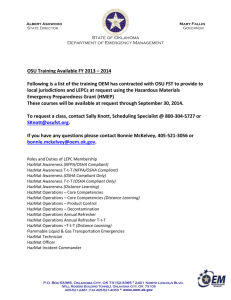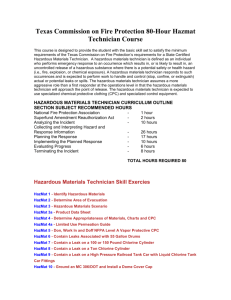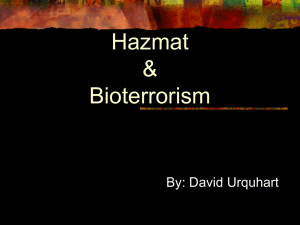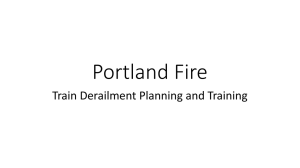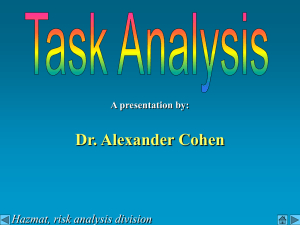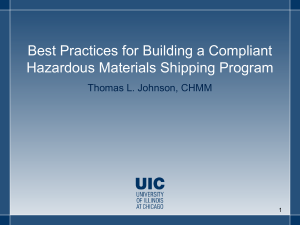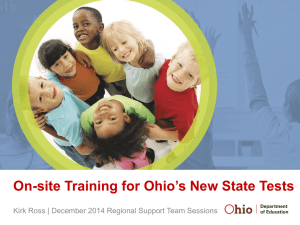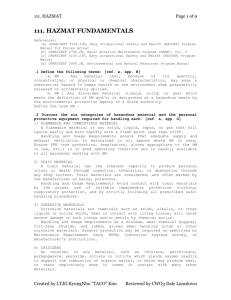WMD-HazMat Rescue WebEx Briefing
advertisement
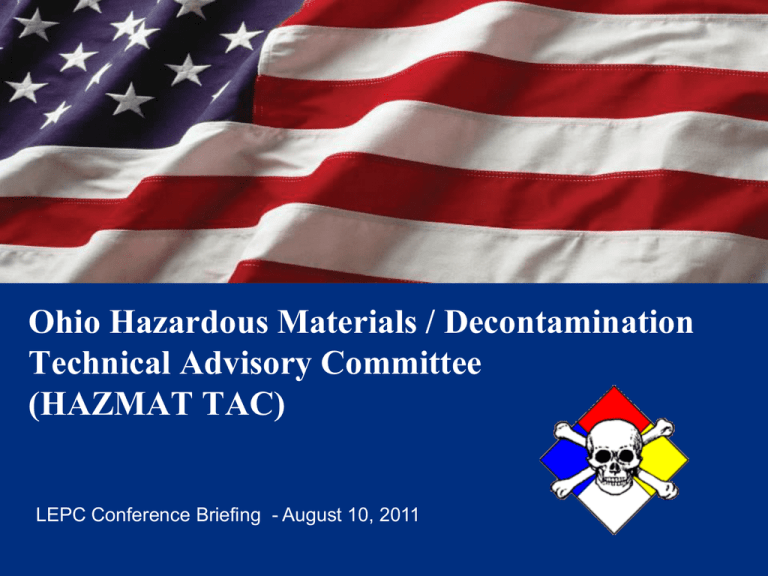
Ohio Hazardous Materials / Decontamination Technical Advisory Committee (HAZMAT TAC) LEPC Conference Briefing - August 10, 2011 Mark Vedder • Battalion Chief, Solon Fire-Rescue, Solon, OH - 1979 • Asst Fire Chief, Chagrin Falls FD, Chagrin Falls, OH - 1974 • Hazmat/WMD Specialist, Chagrin/SE Hazmat Team – 1990 • Hazmat/WMD Team Leader, Cuyahoga County Type 1 – 2010 • Co-Chair, Ohio Hazmat TAC, Ohio EMA – 2004 • Hazmat Instructor, Ohio Fire Academy • Fire Service & Paramedic Instructor, Ohio Dept of Public Safety • Hazmat Instructor, Cuyahoga Community College - 1982 • Advanced Hazmat Life Support Instructor National Governors Association January 5, 2006 Technical Advisory Committee Purpose of the Hazmat/Decon TAC – Develop a capability to respond to an overwhelming event that exceeds local resources. – Provide resources and high technical capability to any part of the state within two hours of a request. – The resources would supplement local or county jurisdictions, and operate under their command and within their established incident command structure 3 TAC Representatives • • • Formed in September 2004 Representatives from more than 30 Hazmat Teams throughout the eight Homeland Security Planning Regions appointed by OFCA Representatives from more than 10 Partner Agencies 4 TAC Regional Coordinators 1. 2. 3. 4. 5. 6. 7. 8. Tom Jaksetic – Toledo FD 1 Mark Vedder – Solon FD 3 Denny Bristow – Dayton FD 6 Bill Brobst – Columbus FD Sil Caggiano – Youngstown FD Miles Davis – Cincinnati FD Brian Robertson – Logan FD Jeff Corder – Coshocton FD 2 5 4 8 7 Co-Chairs: Mark Vedder and Harry Burdick 5 TAC Partner Agencies • • • • • • • • • FBI WMD Coordinators – Cleveland/Cincinnati Ohio Dept of Health Ohio Fire Academy Ohio Emergency Management Agency Cleveland State University ONG 52nd WMD Civil Support Team US Dept of Homeland Security Ohio EMA Directors Association Ohio Fire Chiefs Association 6 Technical Advisory Committee TAC Strategic Goals • Coordinate the overall state and regional response • Regional capability within 2 hours of any location in the state • TAC representation from all regions • Resource Type all resources in the state • Credential all ORS personnel 7 Technical Advisory Committee TAC Objectives • Equipment Inventory • Conduct needs assessment • Prioritize needs • Develop response and operational procedures • Develop training standards • Develop standard logistical needs and support 8 Technical Advisory Commitee • Capabilities Based Planning • Helps Answer 3 Key Questions – How prepared do we need to be? – How prepared are we? – How do we prioritize efforts to close the gap? Using a common language and a common framework, we can work together to build a national system with defined targets for full operational capability. 9 2004 • What is a Hazmat Team? – FEMA Team Typing – Capabilities Based – FIRESCOPE – Required Equipment Lists – NFPA 472 – Training Requirements 10 2005-2006 • What Resources Exist? – Surveys – Regional Coordinators – Ohio Fire Response Plan • Finalize Hazmat/WMD Ops Course – OFA Development – Review and Push Out 11 2006-2007 • Develop Ohio Hazmat Team Typing – Specific Equipment Based upon Team Type (REL) • Meters, PPE, Decon, Reference, Tools, Control, Containment – Specific Number of Trained Personnel • Technicians and Specialists – Specific Training Levels of Personnel • Initial Certification • Refresher Training 12 Hazmat Team – Type III • On-site within 60 minutes of a request • Minimum response of 10 Hazmat Technicians • Capable of: • • • • • • Handling Releases of Known Industrial Chemicals Making Level B entries Control and Containment Using Direct Reading Instruments Technical Decontamination 12 hour Operational Period with Logistical Support 13 Hazmat Team – Type II • On-site within 2 hours of a request • Minimum response of 15 Hazmat Technicians • Capable of: • • • • • • • Handling Releases of Known Industrial Chemicals Identifying or Characterizing Unknown Chemicals Making Level B and/or Level A entries Control and Containment Using Direct Reading Instruments Technical Decontamination 12 hour Operational Period with Logistical Support 14 Hazmat Team – Type I • On-site within 4 hours of a request • Min. Response of 20 Hazmat/WMD Techs • Capable of: • • • • • • • • Handling Releases of Known Industrial Chemicals Identifying or Characterizing Unknown Chemicals Identifying or Characterizing CBRNE Agents Making Level B and/or Level A entries Collecting Public Safety Samples Using Direct Reading Instruments Technical Decontamination 12 hour Operational Period with Logistical 15 Support Team Typing Process • Download Application and Forms • Complete Application – Return to OEMA • OH HM TAC will set Site Visit Date • Site Visit – Powerpoint – Equipment Inspection – Staffing – Training Records – Initial and Refresher – Medical Surveillance 16 Team Typing Process • Results Considered at Next TAC Meeting • Thirty days to resolve deficiencies • Can upgrade within 24 months without additional site visit 17 2007 • Self Typing – Encourage all teams in ORP to Self Type – Listed Self Typed Teams in ORP • Review and Approve Ohio Hazmat/WMD Technician Course 18 2007-2009 • Identified Gaps in the Current Capabilities • Response Time Goals: – Type III – Within 1 Hour of Request – Type II - Within 2 Hours of Request – Type I - Anywhere within 4 Hours of Request Urban Areas within 1 Hour 19 Ohio Hazmat Teams Regional Team Type Richland/ Ashland Co. 2 Updated 07-26-11 = Type 1 = Type 2 = Type 3 = Verified Typed Team The purpose of this map is to provide a graphical representation of the hazmat teams which have self-typed or been verified in Ohio, and who participate in the Ohio Response Plan. It is to be used for planning purposes 20 only and does not represent an endorsement or any specific level of training or funding. 2007 - 2011 • Fund & Build Out Hazmat Capabilities – Type III – Type II – Type I • Is funding available? • What are requirements if we take funding? • Team Typing Verification Site Visits Start in 2007 21 Hazardous Materials/Decon TAC Progress Region 1 Region 2 Region 3 Region 4 Region 5 Region 6 Region 7 Region 8 Typing Inspection In Progress In Progress In Progress In Progress In Progress In Progress In Progress In Progress Stage 2 Phase 2 Type II / I Completed Completed Completed Completed In Progress Completed Completed Completed Stage 2 Phase 1 Completed Completed Completed Completed Completed Completed Completed Completed Completed Completed Completed Completed Completed Completed Completed Completed Completed Completed Completed Completed Completed Completed Completed Completed Stage 3 Type 3 Stage 2 Existing Teams Identified Stage 1 Team Typing definition 2007 - 2011 • Site Visits – Four member site visit team – Verify Equipment from REL – Review Equipment Maintenance Records • Meters, SCBA, PPE, Consumables – Training Records • Initial and Con-Ed – Minimum Personnel – Medical Surveillance Records 23 Team Typing Verification TEAM TYPE SELF TYPED TEAMS VERIFIED TEAMS Type III 44 5 Type II 25 15 Type I 5 3 TOTAL 74 23 24 Current Projects • Complete Verification Visits (5 yr Plan) • Develop Training Programs – – – – Hazmat Branch Officer Course Hazmat Branch Safety Officer Course Hazmat TOX Medic Course Hazmat TOX Medic Protocols • ODPS Certification for HM/WMD Tech • Develop Specific Bio Protocols with ODH for Public Safety Sampling 25 Remaining Goals • • • • Inventory Mass Decon Capabilities Develop database of specialized equip Develop info sharing for team alerts Revise REL 26 More Information www.OhioHazmatTAC.com • TAC Minutes • State Hazmat Response SOG’s • Training Materials – Aware, OPS, Tech, Mission Specific • Typing Materials & Documents 27 Contact Info • Questions? • Mark Vedder – MV298@aol.com – 440-503-6607 Cell 28
